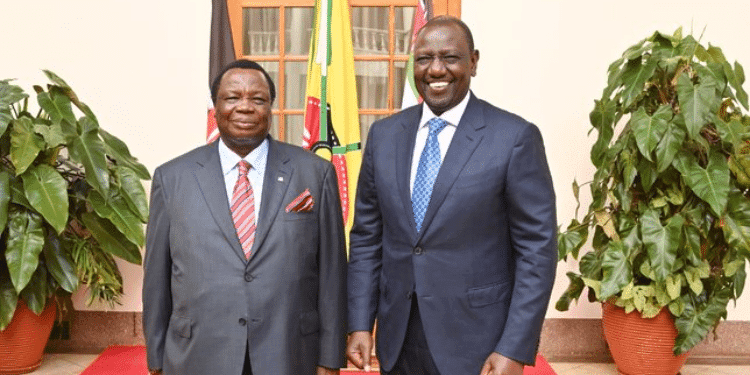The Kenyan government has reduced the deposit required for affordable housing units from 10% to 5%, following a high-level consultative meeting between President William Ruto and COTU Secretary General Dr. Francis Atwoli on June 18.
The meeting, also attended by COTU Assistant Secretary General Ernest Nadome—who sits on the Affordable Housing Board—resulted in several sweeping reforms intended to protect salaried workers and restore public confidence in the Affordable Housing Levy.
A statement by COTU read, “We wish to inform Kenyan workers and the public that following a high-level consultative meeting between H.E. President Dr. William Samoei Ruto and the Secretary General of COTU (K), critical reforms have been implemented to ensure that the Affordable Housing Levy is utilized solely for its intended purpose.“
Key among the resolutions was the immediate suspension of the use of housing levy funds for market construction. These funds will now be redirected solely toward actual housing developments. Atwoli confirmed that the government has agreed to refund all funds previously allocated for markets.
Furthermore, all infrastructure funded through the levy—including roads, schools, and health centers—must now be constructed only within approved housing projects. Where integration is not possible, the government will support nearby alternatives that directly serve housing communities.
To enhance fairness in housing allocation, salaried workers who contribute to the levy will now be given first priority. These workers will receive automatic consideration for units, excluding the social housing category.
A special committee will be established to track and recover funds that were previously diverted. This committee will comprise representatives from both the national and county governments, and will work under the oversight of the Affordable Housing Board.
The talks resulted in five key resolutions reshaping the levy’s administration:
1. Deposit Slashed from 10% to 5%
To make housing units more accessible, the initial down-payment required from salaried workers will now be 5% of the unit’s cost—down from the previous 10%. This marks a direct response to affordability concerns raised by workers’ unions and the public.
2. Suspension of Market Projects Under the Levy
The government will halt the construction of markets funded through the Affordable Housing Levy. Only 400 pre-approved markets will continue, with remaining funds redirected strictly toward the building of affordable homes.
Atwoli stated, “The government has committed to refunding all funds previously allocated for market construction under the housing program.”
3. Targeted Infrastructure Spending
Moving forward, all physical and social infrastructure—such as schools and clinics—will be developed only within or near approved affordable housing projects. In cases where integration isn’t possible, upgrades will be made to nearby public utilities.
4. Salaried Contributors to Be Prioritized
The allocation of housing units will now prioritize salaried contributors to the housing levy, excluding individuals classified under the social housing category. This move is aimed at ensuring those who pay into the scheme benefit directly.
5. Formation of Oversight Committee
A new committee under the Affordable Housing Board will be tasked with overseeing the reallocation of previously misused funds. It will include representatives from both national and county governments and will ensure market revenues or recoveries are redirected to housing.
Atwoli welcomed the government’s commitments, stating, “We thank the President for his openness to dialogue and commitment to ensuring that the levy serves Kenyan workers.”
This move comes amid growing public scrutiny over allegations of misused housing levy funds, with Atwoli previously raising concerns about MPs redirecting allocations toward unrelated projects like schools and hospitals.

